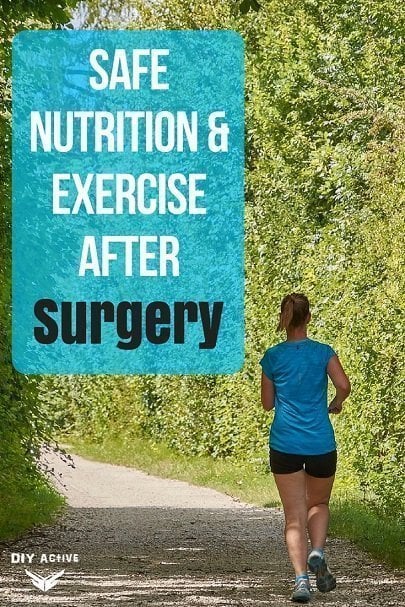Coming Back: Exercise after surgery
Before starting any exercise program after surgery makes sure to consult your doctor! Undergoing surgery is generally a traumatic experience so finding the correct balance between rest, activity and good nutrition is important to recovery. Enjoy the great information in this article!
Exercise After Surgery – Be Safe
How soon activity can be resumed will depend on the type of surgery and medical advice.
Some surgeries such as knee or hip operations require light activity/exercise soon after surgery to quickly re-establish range of motion and strength. More invasive surgeries such as heart bypass need complete rest but movement is still important to prevent complications such as deep vein thrombosis and pneumonia.
Exercise after Breast Cancer Surgery

- Help relieve neck, shoulder, and back pain which can be common after breast cancer surgery
- Promote drainage of lymph fluids to reduce the risk of lymphoedema
- Restore normal posture and movement after surgery
- Improve flexibility, strength, confidence, and wellbeing
There are a number of exercise routines that can be performed at home without any special equipment. A simple towel can be used to perform gentle exercises such as front raises or sweeps in order to regain mobility of shoulders and chest after a mastectomy.
Exercise after Heart Surgery
Special care needs to be taken after invasive surgery as while mobility is important, it must be reintroduced slowly and with the advice of doctors. Deep breathing and coughing exercises are usually the first stage followed by gentle exercises such as walking.
Wounds must be given time to heal, intensive exercise could cause swelling, scaring and even infection if sweat and dirt gets into the wound.
The Australian heart foundation says that most heart patients can go back to normal daily activities within 2-4 weeks of heart surgery and can resume sports such as golf, cycling, or swimming, etc. after about 6 weeks.
The general advice is to take it slowly at first and build up the exercise over a number of weeks. If exercise causes pain or discomfort, the patient should stop immediately.
The key role of exercise after Liposuction
Liposuction is one of the most popular elective surgeries performed in Australia and worldwide at the moment. Liposuction.com says most surgeons encourage clients to walk on the evening of the procedure to avoid blood clots in the legs or lungs.
Research into Liposuction has shown:
- The body may compensate for Liposuction by storing fat in other areas. This can often be visceral fat (fatty tissue around the organs) which is linked to heart disease and diabetes.
- Research undertaken by University of São Paulo, Brazil in 2012 studied two groups of women after Liposuction, one group exercised three times a week; the other didn’t exercise at all. After four months, the women who exercised regained little or no weight while the other group had gained weight with a 10% increase in visceral fat.
Post-Surgical Nutrition
Eating the right food will also have a major impact on the speed of recovery after surgery. The body requires additional calories and nutrients in order to rebuild and recover after surgery.
- Vitamins C, which aids in soft tissue (collagen) repair can be found in citrus fruits, strawberries, kiwi, bell peppers, brussels sprouts, and broccoli.
- Vitamin E which plays an important role in antioxidant defense can be found in almonds, sunflower seeds, peanuts, wheat germ, and plant oils.
While the body is trying to repair and recover, extra calories are needed. Loss of appetite due to discomfort, pain, and medication can make this difficult. Eating small meals frequently, between meals snacking, plenty of fluids and exercise are the best ways to get the necessary nutrition.
Wrap-Up: Exercise After Surgery
Exercise and good nutrition is the key to a good recovery after surgery.
It is important to follow medical advice about both exercise and nutrition as trying to do too much too soon can cause damage to the body.
Exercise and healthy eating improves circulation, keeps the spirits up, and helps to fight depression that can be experienced after surgery.
- Get Motivation To Go To The Gym - May 16, 2014
- Tired of the Gym? Lose Weight the Fun Way - April 4, 2014
- Safe Nutrition & Exercise After Surgery - March 21, 2014